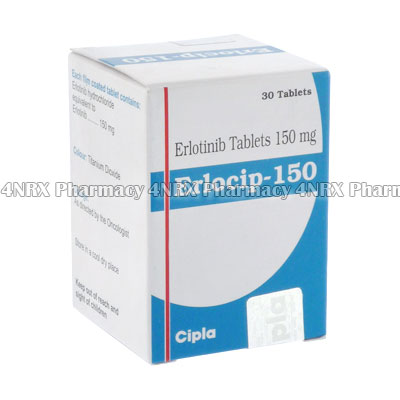 |
Home  Cancer Cancer  Erlocip (Erlotinib) Erlocip (Erlotinib) |
|
|||||||||
|
|
Erlocip (Erlotinib)
What is Erlocip (Erlotinib) used for? Erlocip (Erlotinib) is an oral cancer medication used to treat patients who are suffering from lung or pancreatic cancer. The medication operates by preventing the reproduction or spread of cancer cells. This allows other procedures or medications to be used to remove or eliminate the remaining tumours or cancer cells. Your doctor may prescribe this medication to be used along with others or for the treatment of other unlisted conditions, as well. How should I use Erlocip (Erlotinib)? Erlocip (Erlotinib) should be used strictly according to your doctor`s instructions to get the safest and most effective results from treatment. Most patients are prescribed to take one tablet each day, but your particular directions will depend on your age, weight, current health, the condition being treated, and the severity of your symptoms. These should be swallowed with a large glass of water on an empty stomach. It is normally suggested to take the medicine one hour before a meal or two hours after a meal to make sure the stomach is empty. Never split or crush the tablets before use as this may destroy or alter the effects of their contents. Always ask your doctor any questions you have about the medicine to ensure the correct usage. What are the side effects of Erlocip (Erlotinib)? Erlocip (Erlotinib) may cause side effects in some patients including:
Serious side effects possibly requiring immediate medical attention are deterioration of breathing problems, severe diarrhoea, vomiting, chest pain, fever, flu symptoms, eye pain, confusion, unusual swelling, coughing up blood or a substance resembling coffee grounds, darkened urine, discoloured stools, jaundice, or any sign of a skin rash. Contact your doctor about any unusual symptoms that worry you to ensure the correct alterations are made to your dosage or frequency of administration. Please Note Erlocip (Erlotinib) should not be administered to patients who are lactose intolerant, under the age of eighteen, allergic to erlotinib, who have had a bad reaction to similar treatments in the past, or who have severely reduced kidney or liver function. It is also important to inform your doctor if you have a history of peptic disorders, Glibert`s syndrome, reduced liver function, reduced kidney function, or if you are being treated with anti-angiogenic, NSAID, or corticosteroid medications. These conditions may cause unexpected problems requiring special alterations to your treatment. Strictly use Erlocip (Erlotinib) as prescribed and follow all instructions provided by your doctor. Safe, suitable, and optimum dosage can vary and is dependent on the patient`s health and medical history, as well as the condition you are treating. Erlocip (Erlotinib) may not be safe or suitable for all patients. Always ensure your doctor is informed if you are pregnant or breastfeeding, using any other type of medication (including non-prescription medicine, vitamins, and supplements), as well as if you have any allergies, other illnesses, or pre-existing medication conditions. Seek immediate medical attention or proceed to your nearest accident and emergency department if you suffer a hypersensitive or allergic reaction. Symptoms usually present during a reaction of this nature include difficulty breathing or swallowing, swelling of the limbs or face, tight chest, hives, and skin rashes. 
|
||||||||||||||||||